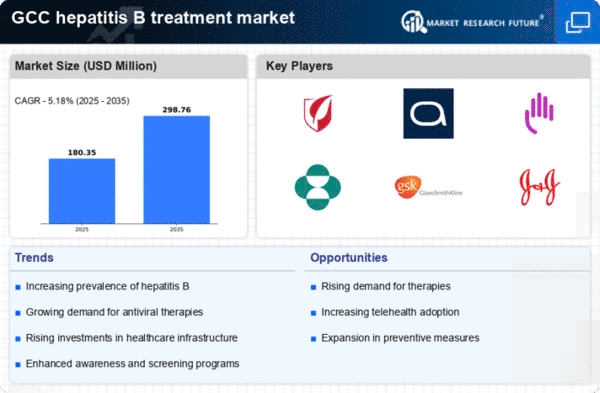Rising Prevalence of Hepatitis B
The increasing prevalence of hepatitis B in the GCC region is a critical driver for the hepatitis b-treatment market. According to health statistics, the prevalence rate in certain GCC countries has reached approximately 2-3%, indicating a substantial population at risk. This rising incidence necessitates enhanced treatment options and healthcare services, thereby propelling market growth. The healthcare systems in these countries are adapting to this challenge by investing in advanced treatment modalities and expanding access to antiviral therapies. As awareness about hepatitis B increases, more individuals seek diagnosis and treatment, further stimulating the demand for effective therapies. Consequently, the hepatitis b-treatment market is likely to experience significant expansion as healthcare providers respond to the growing need for comprehensive management of this chronic condition.
Increase in High-Risk Populations
The increase in high-risk populations within the GCC region is a notable driver for the hepatitis b-treatment market. Certain demographic groups, including migrant workers and individuals with multiple sexual partners, exhibit higher rates of hepatitis B infection. This demographic shift necessitates targeted healthcare strategies and treatment options to address the unique needs of these populations. As healthcare providers recognize the importance of reaching these high-risk groups, there is a growing emphasis on tailored treatment programs and outreach initiatives. This focus on high-risk populations is expected to drive demand for hepatitis B therapies, thereby contributing to the overall growth of the hepatitis b-treatment market.
Advancements in Treatment Technologies
Technological advancements in the treatment of hepatitis B are significantly influencing the hepatitis b-treatment market. Innovations such as direct-acting antivirals and combination therapies have shown improved efficacy and safety profiles, leading to better patient outcomes. The introduction of new therapies has the potential to reduce viral load and improve liver function, which is crucial for managing chronic hepatitis B. Furthermore, the market is witnessing a shift towards personalized medicine, where treatments are tailored to individual patient profiles. This trend is expected to enhance treatment adherence and overall effectiveness. As a result, the hepatitis b-treatment market is poised for growth, driven by the continuous evolution of treatment technologies that offer hope for better management of hepatitis B.
Government Funding and Support Programs
Government funding and support programs play a pivotal role in shaping the hepatitis b-treatment market. In the GCC region, various health ministries are allocating substantial budgets to combat hepatitis B, which includes funding for research, treatment, and public health initiatives. For instance, initiatives aimed at increasing screening and vaccination rates are being implemented, which indirectly boosts the treatment market by identifying more patients in need of care. Additionally, public-private partnerships are emerging to enhance access to antiviral medications, making them more affordable for patients. This financial backing is crucial for the development and distribution of effective treatments, thereby fostering a more robust hepatitis b-treatment market.
Growing Awareness and Education Campaigns
The rise in awareness and education campaigns regarding hepatitis B is a significant driver for the hepatitis b-treatment market. Health organizations and governments in the GCC are actively promoting awareness about the disease, its transmission, and the importance of early diagnosis and treatment. These campaigns are crucial in reducing stigma and encouraging individuals to seek medical help. As awareness increases, more people are likely to get tested and diagnosed, leading to a higher demand for treatment options. This trend is expected to enhance the overall market landscape, as healthcare providers prepare to meet the needs of a more informed patient population. Consequently, the hepatitis b-treatment market is likely to benefit from these educational efforts.
















